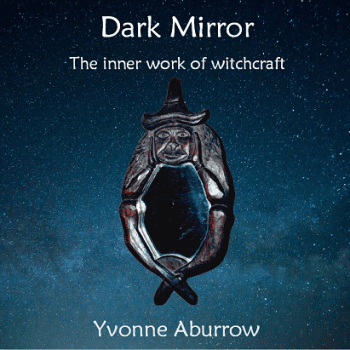Hello, beautiful creatures. Previously on Outside the Charmed Circle, we took a brief look at the Pagan/polytheist narrative of “being chosen” by a god, and the ways in which that narrative is uncomfortably close to the drearily common trope of the “bad boy.” My contention at the close of that piece was that any relationship can be abusive, whether it’s between two humans or between a human and something other-than-human. Being as I’m foursquare against abuse and coercion, and in favor of agency and consent, I have some thoughts on how to best handle that dynamic. Rather than burying the lede four paragraphs down, I’ll cut to the chase: it all starts with saying “no.”
Yes, I’m telling you to say “no” to the gods.

People Are People (And So Are Gods)
I should note, in the interest of full disclosure, that I think of gods and spirits as autonomous, ontologically independent beings, rather than as philosophical concepts or psychological constructs which exist only within our imaginations. This isn’t to say that they’re identical to human beings, merely that they share with us the existential idiosyncrasy of having their own agency and agendas. In other words, they are what we would call “people,” for a given value of the term1. However, a point that is sometimes missed in acknowledging the autonomous agency and power of the gods is that we, too, are autonomous spirits with agency and power. Gods and spirits are people, yes, but so are we.
Is there a difference in power and knowledge? Quite often, yes, especially between gods and humans. After all, there’s a reason we call them “gods,” and not “elementals” or “servitors” or something; part of the definition of “god” is (or, at least, should be) “a being with superhuman power and knowledge.” Does this superior power and wisdom mean that gods are in a position of authority over us—that they should command and we should obey?
Well, now, that’s an interesting question. It certainly can mean that, depending on the nature of your relationship. It’s quite common in both folklore and anecdotal experience for gods to tell devotees to do something the devotees don’t initially understand, but come to realize later were in their best interests. Similarly, one can find plenty of examples of gods telling devotees not to do something, only for the devotees to violate that edict… and suffer the natural consequences. In this dynamic, the god is acting as a figure of authority, power, and wisdom to their devotee, acting as a mentor, a guide, even a parental figure to their human partner.
However, and I cannot state this strongly enough, a mere power differential is not the same as moral authority. Might does not make right, no matter how many ancient Greek historians and modern proponents of kratocracy (or kakistocracy) claim otherwise. Similarly, merely having a greater scope of knowledge isn’t any indicator of sound ethical grounding, as the moral collapse of “meritocracy” in the tech sector suggests.
Where, then, does authority derive? At what point should we suborn our wills to the will of our gods… and, to come back to my pearl-clutch-inducing statement back at the beginning, when should we say “no” to them?
Speaking as a Witch and Saying No
Despite what some medieval witch-hunting manuals might suggest, witchcraft doesn’t teach witches to enslave their wills to powerful beings. On the contrary, it encourages us to work in a mutually-beneficial partnership with them.
“Mutually beneficial?” I hear from the back of the room. “What could we possibly have to offer the gods?”
Well, lots of things. Hands, for one. Sometimes, a god might want to get something moved from point A to point B, and while it might be entirely possible to arrange a fortuitous string of coincidences, it might be a hell of a lot simpler to just ring up a devotee and say, “Hey, take this across town for me.”
Yes, I’m being a teensy bit irreverent, but I say this with all reverence: the gods relate to us for their own reasons, just as we relate to them for our own reasons. Making these relationships just and equitable is both an act of basic self-respect and a profound act of respect and honor for the very gods we would seek to work with, serve, worship, or have any kind of relationships with. Note that I said “equitable,” not “equal”; remember, we’re talking about superhuman entities. Gods are a different order of being, and I’d no more presume to enter into an “equal” relationship with Thor than I would challenge him to an arm-wrestling contest. However, equity (“justice according to natural law or right,” per Merriam-Webster) is something to which every being capable of sentience and sapience is entitled, and humans have every right to insist on equitable treatment (“dealing fairly and equally with all concerned”, again from M-W) from the gods, as from each other.
As a Feri witch, part of the tradition I’ve inherited from my predecessors is a collection of aphorisms from our late, much-beloved Grandmaster Victor Anderson. One of these is an injunction against giving away your power, to anyone or anything. This concept is the logical extension of several Feri principles, and the ground of many of our practices. Giving away your power is an abdication of responsibility, a shying-away from your connection to your personal god-self, which is antithetical to everything Feri teaches. The gods we work with generally want us to be our truest selves, the best versions of ourselves we can be, both for our own benefit and for the world’s. Actually, the dichotomy I’m using there is misleading: being the best people we can be is intrinsically, ultimately beneficial to us, both individually and as a part of the greater pattern of gods, spirits, animals, plants, stones, energy, matter, and everything else which comprises all of existence. Regardless of whether or not you’re Feri, or any sort of witch or Pagan for that matter, part of being your true self is owning your own power, being accountable for the things you say and do. Your word is your will, and your actions are the manifestation of that will.
I realize how closely what I’m saying here verges on derpy new-age psychobabble, so let’s bring it back to earth a little: we do what we are, and we become what we do. Saying and doing things that are false to who we truly are is a kind of betrayal and blasphemy, and ultimately changes us into people we may not wish to be. If we don’t want to become the sort of people who say or do those things, we have to be willing to step into our own power. We have to be willing to say “no.”
It is, in fact, this ability to say “no” which makes saying “yes” have any meaning or value. The act of giving consent—to sexual activity, to divine communion, to anything at all—is meaningless without the ability to withhold that consent. It becomes an empty formality, voiced by a depersonalized being without agency.
This includes every single one of our relationships, including those we have with gods. Remember, not all gods are benevolent or beneficent, and not all spirits are who or what they claim to be. Our desire to connect with something greater than ourselves can lead us to make questionable relationship choices, in both the quotidian and the numinous realms. It can also lead us to accept and excuse behaviors from divine beings that we wouldn’t accept from humans.
Don’t accept them. Don’t excuse them. You belong to yourself, and you get to decide who has access to you, to your body or mind or spirit. You have the right to say no. You have the right to consent, and to withhold consent. You have the right to set the terms of your relationships, and to renegotiate those relationships over time.
And any being who can’t respect that—human, spirit, or god—can go to hell. Metaphorically or literally.
Be strong, dear ones, and stand in your power. ♥
- If this conflicts with your own cosmological framing, I encourage you to translate anything I say here into terms you find more comfortable. I also encourage you, at least for a moment, to look at these questions through the lens I’m offering. I’m not here to tell you you’re practicing wrong, but there are some questions which look a bit different if you think of gods as people, rather than as constructs. If nothing else, it could give you some insights you might otherwise have missed.
















